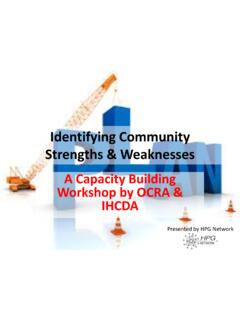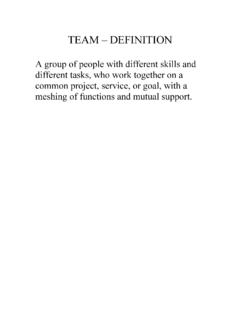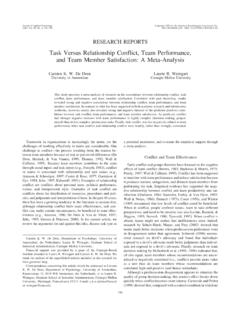Transcription of The Impact of Interpersonal Communication Skills on ...
1 International Journal of Language and Linguistics Vol. 4, No. 3, September 2017 28 The Impact of Interpersonal Communication Skills on organizational effectiveness and Social Self-Efficacy: A Synthesis Ephraim Okoro, PhD Howard University Melvin CWashington, PhD Howard University Otis Thomas,PhD Bowie State University Abstract This paper synthesizes the role and importance of Interpersonal effectiveness and Communication competence in organizational competitiveness. Several studies concluded that oral Communication Skills are critically significant in business education, and business school graduates are expected to develop this essential/soft Skills competency in order to place themselves in a competitive advantage for employment opportunities.
2 Recent institutional surveys consistently determined that Interpersonal Communication effectiveness contributes immensely to increased workforce performance and overall organizational productivity . Additionally, it improves hiring opportunities for business school graduates as well as facilitates rapid promotional advancements in the organization. The paper stresses the urgent need to make oral and written Communication Skills required in business education curriculum. Introduction/Background Over the past ten years, academic researchers (Brun, 2010; Wilson, 2005; Ridder, 2003) and institutional studies (AAC&U, 2015; Job Outlook, 2016; career-Builder.)
3 2017) have re-evaluated the critical importance of Interpersonal Communication in domestic and global organization. This is especially critical for graduating students and for employees in the process of changing jobs or applying for new or higher positions in organizations. These studies have determined that Interpersonal competence greatly improves a candidate s competitive advantage in obtaining a position as well as improving the operations of business organization organizations. Another recent study (Singh, 2014) noted that businesses, agencies, and institutions of all kinds place a high premium on Interpersonal effectiveness because of the centrality of Communication Skills in the productivity of organizations.
4 The study further argues that both administrative and managerial functions and activities in organization settings require effectiveness of Communication Skills . Additionally, effective and efficient Interpersonal and group Communication Skills are significant factors in evaluating the overall competence of a job seeking candidate. Singh and colleague (2014) noted that organizational recruiters place a higher emphasis on Interpersonal Communication Skills as essential characteristic selecting and interviewing job applicants. As scholars across business and communications disciplines continue to identify and evaluate essential Skills needed to achieve the level of productivity , performance, and excellence needed for competitive advantage, competence in oral Communication , employers identified writing, speaking, and listening Skills as fundamental.
5 These Skills are the prerequisites students personal and professional success in the twenty-first workforce. According to a recent survey conducted for the Association of American Colleges and Universities (AAC&U) by Hart Research Associates (2015) on college learning and career success, it was determined that Communication Skills are essential for performing in business, academic, and professional environments. No matter the situation one faces in personal or professional contexts, one will need to communicate effectively and interact people of diverse cultures, utilizing speaking and listening Skills to create and sustain impressions.
6 For instance, in a personal and professional settings, trips to various places, including mingling with colleagues and classmates, requires effective Interpersonal Communication Skills (Hybels & Weaver, 2015). ISSN 2374-8850 (Print), 2374-8869 (Online) Center for Promoting Ideas, USA 29 Communication -Based Approach to Competitive Advantage In the work environments, much Communication is required in order to accomplish personal and group tasks and projects because employees need to communicate with co-workers, supervisors, directors, other internal and external stakeholders of the organization.
7 Soft Skills , which are also identified as essential Skills , are the critical Skills that demonstrate Interpersonal competence and organizational Communication effectiveness which are essential for managerial or administrative success. The centrality of Communication Skills in workforce performance and productivity in organizations have been validated by numerous studies in the past decade (Morreale, Osborn, & Pearson, 2000; Alshare & Hindi, 2004; Baker &Thompson, 2004; Gray 2010). As noted in a recent survey in the Workforce- Skills Preparedness Report, PayScale (2016),it is now required that college graduates entering the workforce for the first time should communicate with confidence, express themselves competently, and be proficient in public speaking in group settings.
8 The survey cautions that poor Communication Skills could severely prevent students and anyone aspiring to managing or administrative position from achieving the goal or expectations. Evidently, business organizations at all levels are willing to recruit and promote job applicants who have a comprehensive background in oral, written, and presentation Skills . Therefore, well-trained college graduates and other job-seeking candidates should endeavor to acquire these soft Skills that will significantly enhance their competitive advantage in the job market. The use of proper language, decorum, and professional words/phrases to express thoughts during business and social meetings, group interactions, and presentations creates favorable impression in considering a job application for employability.
9 Communication Competence and Sustainable Competitive Advantage In their analysis of the knowledge-based approach to sustainable competitive advantage, DeNisi, Hitt, and Jackson (2003, p 3) noted that organizations are competing in a challenging global context that requires the acquisition of essential Skills that would enable their workforce to outperform their competitors. Additionally, Hitt, Keats, and DeMarie (1998) had expressed the view that business organizations must identify new sources of knowledge, broaden their competitive landscape, and develop a workforce that is capable of performing tasks differently in order to be successful and benefit from globalization.
10 Researchers DeNisi and colleagues identified knowledge-based resources as referring to Skills , abilities, and learning capacity, which could be developed through formal or informal training. Some of these essential Skills , otherwise known as soft Skills , which are required by today s employers include the ability to effectively communicate orally, the ability to work effectively with others in teams and in diverse groups, the ability to effectively communicate in writing, and ability to demonstrate critical thinking and analytical reasoning Skills . These Skills are critically needed by organizations of new college graduates and of people wishing to advance their career in competitive organizations (Association of American Colleges and Universities, AAC&U, 2015).







